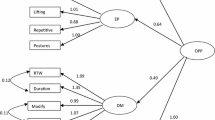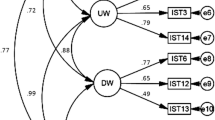Abstract
This study’s aim is to adapt the theory of technostress creators and inhibitors (Ragu-Nathan et al. 2008; Inf Sys Res 19(4):417–433. https://doi.org/10.1287/isre.1070.0165) culturally and linguistically to the French context and evaluate it from the perspective of occupational psychology and ergonomics. This research was divided into two parts. The first included the development of a French version of the scale using the backtranslation method, an assessment of content validity on the advice of expert judges in ergonomics and occupational psychology, and a study of the clarity of the items after the application of this preliminary version to a population similar to the target population. The second part of this research included the psychometric analysis of the French version of the scale after its application to a sample of French workers (n = 307). This process included an evaluation of its internal consistency, an evaluation of its internal structure using a confirmatory factor analysis and of its construct validity using one of the dimensions of the mental workload scale, i.e., available resources (Galy 2020; uant Methods Psychol 16(3):240–252. https://doi.org/10.20982/tqmp.16.3.p240). The results indicate an optimal level of internal consistency of the dimensions, except for dimensions of Techno-Invasion and Techno-Insecurity. Likewise, the results of the confirmatory factor analysis led to the suppression of two measurement items within these same dimensions. Finally, the study confirmed that technostress creators negatively influence the operator’s resources while technostress inhibitors positively influence them.

Similar content being viewed by others
References
Aiken LR (1980) Content validity and reliability of single items or questionnaires. Educ Psycho Meas 40:955–959. https://doi.org/10.1177/001316448004000419
Aiken LR (1985) Three coefficients for analyzing the reliability and validity of ratings. Educ Psycho Meas 45(1):131–142. https://doi.org/10.1177/0013164485451012
Anderson A (1985) Technostress: another Japanese discovery. Nature 317:6. https://doi.org/10.1038/317006b0
Ayyagari R, Grover V, Purvis R (2011) Technostress: Technological Antecedents and Implications. MIS Quarterly 35(4):831–858. https://doi.org/10.2307/41409963
Bandura A (1998) Personal and collective efficacy in human adaptation and change. Adv Psychol Sci 1(1):51–71
Benedetto-Meyer M, Klein T (2012) Le rôle des TIC dans les reconfigurations des espaces et des temporalités : le brouillage des frontières entre travail et hors-travail. In: Klein T, Ratier D. (ed.) L’impact des TIC sur les conditions de travail, Rapports et documents n° 49, Centre d’analyse stratégique et direction générale du travail, pp 173–206
Bentley TA, Teo ST, McLeod L, Tan F, Bosua R, Gloet M (2016) The role of organisational support in teleworker wellbeing: A socio-technical systems approach. Appl Ergon 52:207–215. https://doi.org/10.1016/j.apergo.2015.07.019
Bhatt N, Kothari T (2015) Technostress and coping mechanism. Nirma Univ J Bus Manag Stud 35(1):85
Bobillier-Chaumon ME (2003) Evolutions techniques et mutations du travail : émergence de nouveaux modèles d’activité. Le Trav Hum 66:163–194. https://doi.org/10.3917/th.662.0161
Bondanini G, Giorgi G, Ariza-Montes A, Vega-Muñoz A, Andreucci-Annunziata P (2020) Technostress dark side of technology in the workplace: a scientometric analysis. Int J Environ Res Public Health 17(21):8013. https://doi.org/10.3390/ijerph17218013
Brod C (1984) Technostress: The human cost of the computer revolution. Addison Wesley Publishing Company, Reading
Cadieux N, Cadieux J, Youssef N, Mosconi E (2020) Techno (stress) and techno (distress): Validation of a specific technostressors index (TSI) among Quebec lawyers. In Proceedings of the 53rd Hawaii International Conference on System Sciences https://https://doi.org/10.24251/HICSS.2020.747
Cascio WF, Montealegre R (2016) How technology is changing work and organizations. Annu Rev Organ Psychol Organ Behav 3(1):349–375. https://doi.org/10.1146/annurev-orgpsych-041015-062352
Castillo JM (2022) Etude de la charge mentale et du stress engendrés par l’usage des technologies numériques en milieu professionnel. Dissertation, Université Côte d’Azur
Chevallet R, Moatty F (2012) Impacts des TIC sur les rythmes, l’autonomie et le contrôle du travail . In: Klein T, Ratier D. (ed.) L’impact des TIC sur les conditions de travail, Rapports et documents n° 49, Centre d’analyse stratégique et direction générale du travail, pp 103–130
Compeau DR, Higgins CA (1995) Computer self-efficacy: Development of a measure and initial test. MIS Quarterly, 189–211 https://doi.org/10.2307/249688
Coutrot T (2017) Insécurité du travail, changements organisationnels et participation des salariés : quel impact sur le risque dépressif ? Report Dares n°061 https://dares.travail-emploi.gouv.fr/sites/default/files/pdf/2017-061.pdf. Accessed 06 May 2023
Cucchi, A (2020) Technostress appraisal: Proposition d’une échelle de mesure. Oral Communication, Association Information and Management 2020, Marrakech, Maroc
Day A, Paquet S, Scott N, Hambley L (2012) Perceived information and communication technology (ICT) demands on employee outcomes: the moderating effect of organizational ICT support. J Occup Health Psychol 17(4):473. https://doi.org/10.1037/a0029837
Dragano N, Lunau T (2020) Technostress at work and mental health: concepts and research results. Curr Opin Psychiatry 33(4):407–413. https://doi.org/10.1097/YCO0000000000000613
Escurra L (1988) Cuantificación de la validez de contenido por criterio de jueces. Rev Psicol 6(1–2):103–111
Fischer T, Pehböck A, Riedl R (2019) Is the technostress creators inventory still an up-to-date measurement instrument? Results of a large-scale interview study. 14th International Conference on Wirtschaftsinformatik, February. Siegen, Germany, pp 24–27
Fornell C, Larcker DF (1981) Evaluating structural equation models with unobservable variables and measurement error. J Mark Res 18(1):39–50. https://doi.org/10.2307/3151312
Fuglseth AM, Sørebø Ø (2014) The effects of technostress within the context of employee use of ICT. Comput Hum Behav 40:161–170. https://doi.org/10.1016/j.chb.2014.07.040
Fuhrer C (2021) Diminuer le technostress pour que s’exprime la capacité d’absorption de l’utilisateur ? Rev Sci Gest 309–310:57–71
Galy E (2020) A multidimensional scale of mental workload evaluation based on Individual-Workload- Activity (IWA) model: validation and relationships with job satisfaction. Quant Methods Psychol 16(3):240–252. https://doi.org/10.20982/tqmp.16.3.p240
Guillemin F, Bombardier C, Beaton D (1993) Cross-cultural adaptation of health-related quality of life measures: literature review and proposed guidelines. J Clin Epidemiol 46(12):1417–1432. https://doi.org/10.1016/0895-4356(93)90142-N
Hair JF, Black WC, Babin BJ, Anderson RE, Tatham RL (2014) Multivariate data analysis, 7th edn. Pearson Education Limited Harlow, Essex
International Test Commission (2017) The ITC Guidelines for Translating and Adapting Tests, 2nd edn
Lancry A (2007) Incertitude Et Stress Le Trav Hum 70:289–305. https://doi.org/10.3917/th.703.0289
Lazarus RS, Folkman S (1984) Stress, Appraisal, and Coping. Springer Publishing Company, New York
Legner C, Eymann T, Hess T et al (2017) Digitalization: opportunity and challenge for the business and information systems engineering community. Bus Inf Syst Eng 59(4):301–308. https://doi.org/10.1007/s12599-017-0484-2
Mergel I, Edelmann N, Haug N (2019) Defining digital transformation: Results from expert interviews. Gov Inf Q 36(4):1–16. https://doi.org/10.1016/j.giq.2019.06.002
Molino M, Ingusci E, Signore F, Manuti A, Giancaspro ML, Russo V, Zito M, Cortese CG (2020) Wellbeing costs of technology use during COVID-19 remote working: an investigation using the Italian translation of the Technostress Creators Scale. Sustainability 12(15):5911. https://doi.org/10.3390/su12155911
Ngoc QAP (2017) L’impact de l’utilisation des outils numériques sur la charge mentale des salariés. Mieux travailler à l’ère du numérique : définir les enjeux et soutenir l’action 25–33
Nunnally JC, Bernstein I (1994) Psychometric theory, 3rd edn. McGraw-Hill, New York
Orlikowski W (1992) The duality of technology: rethinking the concept of technology. Org Sci 3(3):398–427
Ragu-Nathan TS, Tarafdar M, Ragu-Nathan BS, Tu Q (2008) The consequences of technostress for end users in organizations: conceptual development and empirical validation. Inf Sys Res 19(4):417–433. https://doi.org/10.1287/isre.1070.0165
Riedl R, Kindermann H, Auinger A, Javor A (2013) Technostress from a neurobiological perspective: system breakdown increases the stress hormone cortisol in computer users. Bus Inf Syst Eng 4(2):61–69. https://doi.org/10.1007/s12599-012-0207-7
Rosenberg N (1994) Incertidumbre y cambio tecnológico. Revista De Historia Industrial 6:11–30
Salanova M, Llorens S, Cifre E (2013) The dark side of technologies: technostress among users of information and communication technologies. Int J Psychol 48:422–436. https://doi.org/10.1080/002075942012680460
Salazar Concha CE (2019) El Tecnoestrés y su efecto sobre la productividad individual y sobre el estrés de rol en trabajadores chilenos: un estudio psicométrico y predictivo. Dissertation, Universitat Oberta de Catalunya
Sellberg C, Susi T (2014) Technostress in the office: a distributed cognition perspective on human–technology interaction. Cogn Tech Work 16(2):187–201. https://doi.org/10.1007/s10111-013-0256-9
Siitonen V, Ritonummi S, Salo M, Pirkkalainen H (2022) The emergence of technostress in software development work: Technostressors and underlying factors. In: Bednar P, Islind, AS, Vallo-Hult H, Nolte A, Rajanen M, Zaghloul F, Ravarini A, Braccini AM (eds), Proceedings of the 8th International Workshop on Socio-Technical Perspective in Information Systems Development (STPIS 2022) RWTH Aachen. CEUR Workshop Proceedings, 3239., pp. 265–286
Tarafdar M, Tu Q, Ragu-Nathan BS, Ragu-Nathan TS (2007) The Impact of technostress on role stress and productivity. J Inf Manag Syst 24:301–328. https://doi.org/10.2753/MIS0742-1222240109
Tarafdar M, Pullins EB, Ragu-Nathan TS (2015) Technostress: negative effect on performance and possible mitigations. Inf Syst J 25(2):103–132. https://doi.org/10.1111/isj.12042
Vallerand RJ (1989) Vers une méthodologie de validation transculturelle de questionnaires psychologiques : Implications pour la recherche en langue française. Can Psychol 30(4):662–680. https://doi.org/10.1037/h0079856
Weil MM, Rosen LD (1997) Technostress coping with technology @Work @Home @Play. Wiley, Hoboken
Wheaton B, Muthen B, Alwin DF, Summers GF (1977) Assessing reliability and stability in panel models. Sociol Methodol 8:84–136
Williams MD, Dwivedi YK, Lal B, Schwarz A (2009) Contemporary trends and issues in IT adoption and diffusion research. J Inf Tech 24(1):1–10. https://doi.org/10.1057/jit.2008.30
Acknowledgements
The first author was supported by an industrial research agreement financed by the French ANRT (Association Nationale de la Recherche et de la Technologie) in association with the company Npxlab SaaS (France) and the Université Côte d’Azur. The authors express their gratitude to Raoul Do Nascimento for his strong support and helpful advice during the conduction of this research.
Author information
Authors and Affiliations
Contributions
All of the authors participated in the desing of the study. J.M.C wrote the main manuscript text and all authors conducted the analyses of the data and reviewed the manuscript.
Corresponding author
Ethics declarations
Conflict of interests
The authors declare no competing interests.
Additional information
Publisher's Note
Springer Nature remains neutral with regard to jurisdictional claims in published maps and institutional affiliations.
Supplementary Information
Below is the link to the electronic supplementary material.
Rights and permissions
Springer Nature or its licensor (e.g. a society or other partner) holds exclusive rights to this article under a publishing agreement with the author(s) or other rightsholder(s); author self-archiving of the accepted manuscript version of this article is solely governed by the terms of such publishing agreement and applicable law.
About this article
Cite this article
Castillo, J.M., Galy, E. & Thérouanne, P. Psychometric properties of the French version of the technostress creators and inhibitors scale. Cogn Tech Work 25, 357–372 (2023). https://doi.org/10.1007/s10111-023-00738-2
Received:
Accepted:
Published:
Issue Date:
DOI: https://doi.org/10.1007/s10111-023-00738-2




